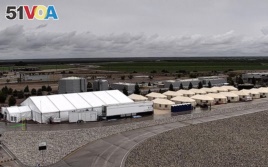07 July, 2018
Tornillo, Texas, is a small farming community in the southwestern United States. It sits along the Mexican border, a short drive from the city of El Paso in West Texas.
A month ago, the federal government chose Tornillo as the place to set up 450 beds for immigrant children. The small town is providing temporary housing for children who were separated from their families as a part of the government's policy on migrants.
More than 350 youngsters moved in on June 14. Since then, the town has become the center of a national debate over illegal immigration.
The 1,600 citizens of Tornillo have seen thousands of protestors and near daily visits from officials at all levels of government.
U.S. lawmakers, Texas officials, human rights activists and others have gone there and visited the children, mostly teenaged boys.
At the same time, local farm workers continue their daily routine. Some water crops as buses carrying immigrant children pass through Tornillo.
"It's a peaceful town, not a lot goes on," Pablo Barcenas told the El Paso Times newspaper. "It's a nice place to grow up. You can go outside and ride your bike. Everybody knows everybody," he added.
Barcenas lives and works about 400 kilometers away, in Odessa, Texas, but returns to Tornillo as often as he can. He said he was unhappy by the new tent city and the politics behind it.
Last month, President Donald Trump signed an order to end the policy of separating children from parents accused of entering the U.S. illegally. As a result, the military is preparing nearby Fort Bliss and Goodfellows Air Force Base to house tens of thousands of asylum seekers and illegal immigrants who crossed the border as families.
Last week, a federal judge in California ruled that the government must quickly reunite migrant children with their parents. The Tornillo shelter is set to close in July after the children are returned to their families.
In town, few people will ask out loud why their small, quiet community was chosen to house the immigrant families.
County Commissioner Vince Perez called the tent city "disturbing" and said it will likely to cause long-lasting psychological harm to the children.
"This is a practice that really amounts to government abuse and in many respects, I feel, a form of psychological torture," he said.
Perez added that he visited the shelter back in 2016 when it was first created to house immigrant families that had been arrested.

This undated photo provided by HHS' Administration for Children and Families shows the shelter used to house unaccompanied foreign children in Tornillo, Texas.
"The tents are air conditioned and weren't ideal conditions, but the federal government was trying to do something to help address the influx of Central American migrants coming to the U.S.," Perez said. "But it was keeping the family unit together while it awaited a civil hearing."
Perez said he and his office are trying to get as much information as possible to see if they can assist with reuniting the children with their parents.
Former state representative Inocente "Chente" Quintanilla also is critical of the tent city. He believes Tornillo was chosen because of its new port of entry, which opened in late 2014.
Illegal immigration is a difficult issue in a town where half of locals are foreign-born, according to U.S. Census Bureau records.
"I have mixed feelings because I know what my dad went through to bring us to the United States," Quintanilla said. "We were here illegally for eight years."
Quintanilla's father was a farm worker and his family lived on the land where he worked.
In 1951, his father was told if they moved back to Mexico they could begin the process to get visas and live legally in the United States. At the time, Quintanilla was in the first grade.
"The Border Patrol came and picked us up and took us to a house my dad had built in Caseta, Mexico," just across the border from Tornillo, he said. "It took almost a year to fix the papers.
Mario Garcia, 75, who has lived in Tornillo for 25 years also understands the difficulties. He came to the United States illegally after his family's store burned down in Mexico.
Garcia went from working in a store to working in the fields of California. He later became a U.S. citizen. At work, he became a supervisor responsible for up to 5,000 workers.
"I can't say anything good or bad" about the immigration situation, he said.
"When one is in dire need, you want to do anything to improve the situation," he said. "Maybe in another place you think 'I can find food' and 'where I am at, I could die.' When you're in that situation, you're trying to do something for the future of your children, not yourself."
I'm Lucija Millonig.
Susan Shand adapted this article for VOA Learning English based on reports from the Associated Press and the El Paso Times. George Grow was the editor.
_________________________________________________________________
Words in This Story
migrant – n. a person who moves from place to place to find work
tent – n. a temporary, outdoor shelter
bike – n. short for bicycle, a vehicle with two wheels
routine – n. a common or normal way of doing things; a series of things that are repeated
teenaged – adj. of or involving someone from 13 to 19 years of age
psychological – adj. of or relating to the mind of or relating to the mind
address – v. to deal with
influx – n. the arrival of a large number of people
dire – adj. very bad : causing great fear or worry